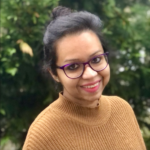
Porismita Borah
Porismita Borah is the Lester M. Smith Distinguished Professor at the Edward R. Murrow College of Communication and a graduate faculty in the Prevention Science program at Washington State University. Borah primarily studies discourses on digital platforms as well as message effects in the context of both politics and health. Her work has been published in top journals such as Journal of Communication, Political Communication, Journal of Computer-Mediated Communication, and New Media and Society. Borah has received funding from multiple sources including the National Institutes of Health, the National Science Foundation, and the Poynter Institute for her research. Learn more about Borah’s research at porismitaborah.com

Erik Bucy
Erik Bucy is the Marshall and Sharleen Formby Regents Professor of Strategic Communication in the College of Media and Communication at Texas Tech University. He teaches and conducts research on disinformation, visual communication, nonverbal behavior, new technology topics, and public opinion about the press. Bucy is the author of the award-winning Image Bite Politics: News and the Visual Framing of Elections (with Maria Elizabeth Grabe, Oxford 2009) and editor of the Sourcebook for Political Communication Research (with R. Lance Holbert, Routledge 2013). Bucy has edited special issues of the International Journal of Press/Politics and American Behavioral Scientist and he is the past editor of the interdisciplinary journal, Politics and the Life Sciences, published by Cambridge. He has been a research fellow at the London School of Economics and the University of Oxford, and has held visiting positions at UCLA, the University of Michigan, and Dartmouth College. He is currently a Fulbright Scholar and visiting fellow at the Institute of Advanced Studies at Loughborough University in the UK, researching a book about press crisis.

Munmun De Choudhury
Munmun De Choudhury is an Associate Professor of Interactive Computing at Georgia Tech and directs the Social Dynamics and Wellbeing Lab. Dr. De Choudhury is passionate about how the web has opened up new opportunities to understand the most pressing challenges of the 21st century, with specific focus on how use of the web might benefit, harm, or simply shape our well-being. She is best known for laying the foundation of a new line of research that utilizes human-centered computational techniques to more deeply understand and improve mental health outcomes, based in ethical analyses of social media data.

Juwon Hwang
Juwon Hwang is an Assistant Professor in the School of Media and Strategic Communications at Oklahoma State University. As a social scientist, Dr. Hwang is committed to examining factors that improve or impair mental health and help public health organizations persuade individuals to better respond to health crises. She focuses on the role of emerging communication technologies in mental health support and on developing, implementing, and testing the effectiveness of targeted messages to advance public health. Much of this work focuses on racial/ethical minorities, people with substance use disorders, and aging populations.

Rachel Kornfield
Rachel Kornfield is an Assistant Professor in Preventive Medicine at Northwestern University. Her research draws on training in health communication, human-computer interaction, and behavior change theories and techniques, and focuses on the role of supportive communication within digital health interventions, including communication with peers, health professionals, and automated messaging systems (e.g., “chatbots”). She is particularly interested in designing and testing digital health interventions that apply computer tailoring to connect individuals to the right type of support, at the right time.

Josephine Lukito
Josephine “Jo” Lukito is an Assistant Professor in the School of Journalism and Media at the University of Texas at Austin. Her work applies computational and mixed methods to study international communication and discourse about political communication, especially as it relates to disinformation and economic issues. Jo’s work has been published in journals such as International Journal of Press/Politics and Political Communication, as well as trade publications like Columbia Journalism Review.

“Estelle” Ranran Z. Mi
“Estelle” Ranran Z. Mi is an Assistant Professor in the Department of Communication, Media & Journalism at Kean University. Her research centers around computer-mediated communication and health, primarily focusing on behavioral change and intervention. She collaborates widely with interdisciplinary experts in communication, medicine, and social psychology. Her work has been published in both communication and medicine journals, such as Health Communication, Patient Education & Counseling, BMC Geriatrics, and Academic Emergency Medicine.

Jiyoun Suk
Jiyoun Suk (Ph.D., University of Wisconsin-Madison) is an Assistant Professor in the Department of Communication at the University of Connecticut, a core faculty member at the Program of Women’s, Gender, and Sexuality Studies, and a faculty affiliate at the Center for mHealth and Social Media. In her research, she looks at how the communication processes in the contemporary media environment shape civic trust, digital activism, and political polarization, primarily employing computational methods. She is particularly interested in how contemporary communication processes are related to the understandings of different social groups, marginalized communities, and political and social outgroups.

Fan (“Ellie”) Yang
Fan (“Ellie”) Yang is an Assistant Professor in the School of Communication and Mass Media at Northwest Missouri State University. She studies the effects of media technology and message construction to support the well-being for vulnerable populations. Her abiding theoretical focus is on how message framing shapes information processing and decision-making and how the affordances of technology shape user experiences, usage patterns, and social outcomes, recently in the context of strategic health communication.

Yini Zhang
Yini Zhang is an assistant professor in the Department of Communication at the University at Buffalo. Her research concerns public opinion and public attention dynamics in the digital media environment, as well as their implications for journalism and communication ecology. Her work has been published in journals such as Journal of Computer-Mediated Communication and New Media & Society.